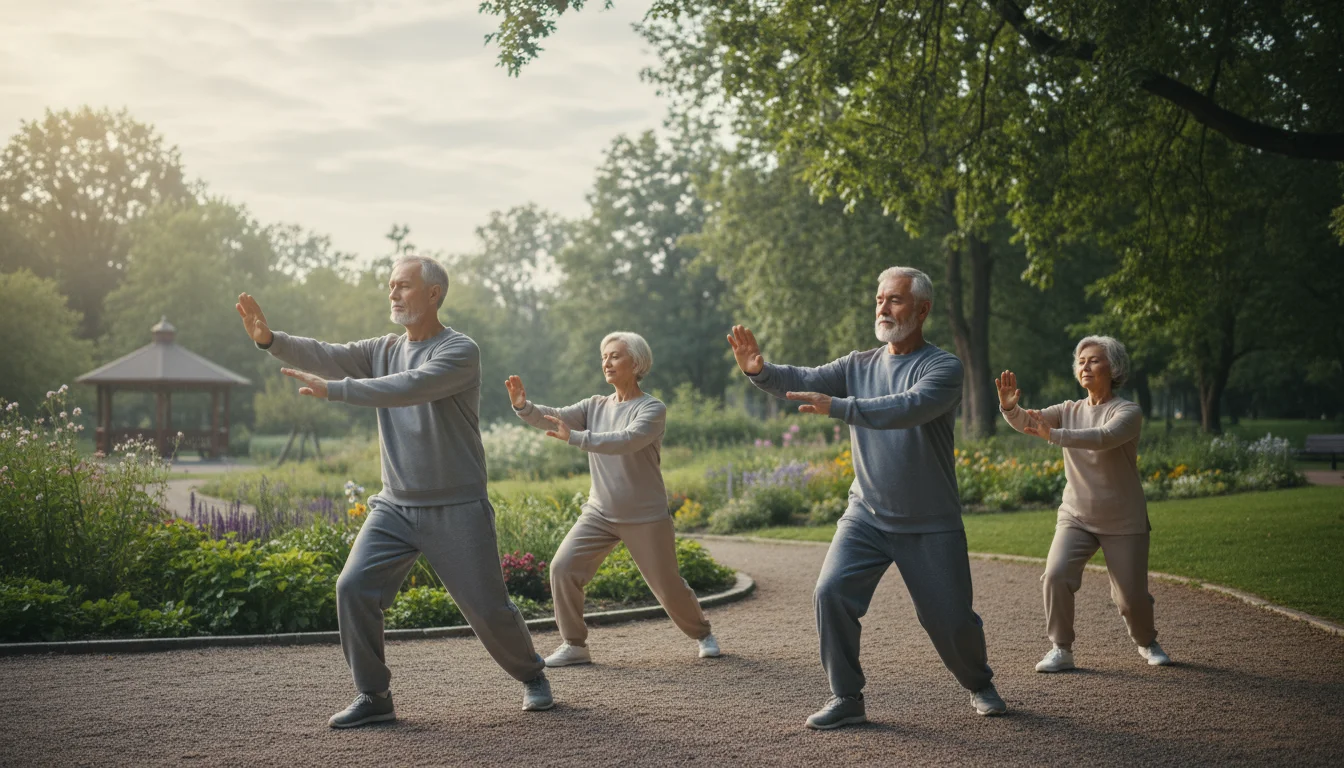

Introduction: Prioritizing Your Health with a Strong Immune System
As we age, maintaining our health becomes more important than ever. It’s the foundation of our independence, our ability to enjoy time with loved ones, and our overall quality of life. One of the most vital components of our health is our immune system. Think of it as your body’s dedicated security team, working around the clock to protect you from illnesses and infections. For seniors, a resilient immune system can mean fewer sick days, faster recovery times, and a reduced risk of complications from common ailments like the flu or pneumonia.
The good news is that we are not powerless in this process. While aging naturally brings changes to our immune response, there are many gentle, safe, and natural steps we can take to support and strengthen our body’s defenses. This guide is designed to provide you with practical, evidence-based strategies for enhancing your immunity. It’s not about quick fixes or unproven “immune boosters,” but about embracing a lifestyle that promotes long-term senior wellness. By focusing on simple, consistent habits, you can empower your body to stay as healthy and strong as possible. Remember, every small, positive change you make is a step toward greater well-being.
Authoritative health information for seniors is provided by the National Institute on Aging (NIA) and the Centers for Disease Control and Prevention (CDC).
For insurance and medical coverage questions, refer to Medicare.gov. For mental health support, consult the National Institute of Mental Health (NIMH).

Understanding the Benefits (and Risks) of Natural Immune Support
Focusing on natural ways to support your immune system yields benefits that extend far beyond just fending off colds. A healthy lifestyle is a holistic approach that improves your body’s overall function. When you eat nutritious foods, stay active, and manage stress, you’re not just helping your immune cells; you’re also supporting your heart health, bone density, cognitive function, and emotional balance.

The Powerful Benefits of a Supported Immune System
A well-supported immune system offers several key advantages for seniors:
- Reduced Frequency of Illness: A stronger immune response can more effectively identify and neutralize viruses and bacteria, meaning you may get sick less often.
- Faster Recovery: When you do catch something, a robust immune system can help you bounce back more quickly and with less severe symptoms.
- Lower Risk of Complications: For seniors, common illnesses like influenza can sometimes lead to more serious conditions like pneumonia. A healthy immune system helps reduce this risk.
- Enhanced Vaccine Efficacy: A well-functioning immune system can respond more effectively to vaccinations, giving you better protection from preventable diseases.
- Improved Overall Vitality: The lifestyle habits that support immunity—good nutrition, regular movement, and adequate rest—also contribute to higher energy levels and a greater sense of well-being.

Understanding the Risks and a Word of Caution on Supplements
While the benefits are clear, it’s crucial to approach immune support with caution and realism. The market is flooded with products labeled as “immune boosters,” often promising miraculous results. It’s important to be a discerning consumer.
The primary risk lies in relying on unproven supplements instead of foundational health practices. Many of these products are not regulated by the Food and Drug Administration (FDA) with the same rigor as prescription medications. This means their purity, potency, and effectiveness are not guaranteed. Some supplements can even be harmful, especially for seniors who may be taking multiple prescription medications. High doses of certain vitamins or minerals can interfere with medications for blood pressure, diabetes, or heart conditions, or they can cause direct harm to organs like the kidneys or liver.
For example, while Vitamin D is essential for immune health, taking too much can lead to a toxic buildup of calcium in your blood. Similarly, while zinc is important, excessive amounts can interfere with copper absorption and may even suppress immunity. This is why the golden rule of senior wellness is to always speak with your doctor or a registered dietitian before starting any new supplement, herb, or vitamin regimen. They can assess your individual health needs, review your current medications for potential interactions, and recommend safe, effective dosages if a supplement is truly necessary.
The safest and most effective path to a stronger immune system is not found in a bottle, but in the simple, daily choices you make.
Authoritative health information for seniors is provided by the National Institute on Aging (NIA) and the Centers for Disease Control and Prevention (CDC).
For insurance and medical coverage questions, refer to Medicare.gov. For mental health support, consult the National Institute of Mental Health (NIMH).

A Step-by-Step Guide to Boosting Your Immunity Safely
Strengthening your immune system is a journey, not a destination. It’s built on a foundation of consistent, healthy habits. Here is a practical, safety-first guide to nurturing your body’s natural defenses.

1. Nourish Your Body with Immune-Supportive Foods
What you eat provides the building blocks for a healthy immune system. Focus on a colorful, balanced diet rich in whole foods rather than relying on processed items or supplements. Aim to include these nutrients in your daily meals:
- Vitamin C: A well-known antioxidant, Vitamin C is thought to increase the production of white blood cells, which are key to fighting infections. Find it in citrus fruits (oranges, grapefruit), bell peppers, strawberries, and broccoli.
- Vitamin D: Often called the “sunshine vitamin,” Vitamin D is crucial for activating immune defenses. Many seniors are deficient, so talk to your doctor about your levels. Sources include fatty fish (salmon, mackerel), fortified milk, and eggs. Safe sun exposure (10-15 minutes a few times a week) can also help.
- Zinc: This mineral helps the immune system function properly and is important for wound healing. Find it in lean meats, beans, nuts, and whole grains.
- Protein: The antibodies and immune cells that fight infection are made of protein. Ensure you’re getting enough from sources like chicken, fish, beans, lentils, and low-fat dairy.
- Antioxidants: Found in brightly colored fruits and vegetables like berries, leafy greens (spinach, kale), and carrots, antioxidants protect your cells from damage.
Safety Tip: Stay hydrated! Water is essential for every bodily function, including your immune response. It helps carry nutrients to your cells and flush out waste. Aim for 6-8 glasses of water a day, unless your doctor has advised otherwise due to a specific health condition.

2. Embrace Gentle, Regular Movement
Physical activity is a powerful tool for senior wellness. Moderate exercise can improve circulation, allowing immune cells to move through your body more freely and do their job more effectively. It can also reduce inflammation and help manage stress.
- Walking: A brisk 30-minute walk most days of the week is a fantastic, low-impact starting point.
- Water Aerobics: The buoyancy of water is gentle on the joints, making this an excellent option for those with arthritis.
- Tai Chi or Gentle Yoga: These practices combine slow, deliberate movements with deep breathing, which is great for balance, flexibility, and stress reduction.
Safety Tip: Always consult your doctor before beginning a new exercise program. Start slowly and listen to your body. It’s better to do 10-15 minutes of gentle activity every day than to overexert yourself once a week. The goal is consistency, not intensity.

3. Prioritize Restful, Restorative Sleep
Sleep is when your body repairs and recharges. During sleep, your immune system releases proteins called cytokines, some of which help promote sleep and fight infection. Chronic sleep deprivation can decrease the production of these protective proteins, making you more susceptible to illness.
- Stick to a Schedule: Try to go to bed and wake up around the same time each day, even on weekends.
- Create a Relaxing Routine: An hour before bed, dim the lights, turn off screens (TV, phone, tablet), and do something calming like reading a book, listening to soft music, or taking a warm bath.
- Optimize Your Bedroom: Keep your bedroom dark, quiet, and cool for the best possible sleep.
Safety Tip: If you struggle with chronic insomnia or suspect you have a sleep disorder like sleep apnea, speak with your doctor. These are treatable medical conditions.

4. Manage Stress Effectively
Long-term stress can wreak havoc on your immune system. When you’re stressed, your body produces a hormone called cortisol. Over time, elevated cortisol levels can suppress your immune response. Finding healthy ways to manage stress is crucial.
- Deep Breathing: Simply taking a few slow, deep breaths can calm your nervous system. Inhale slowly through your nose for four counts, hold for four, and exhale slowly through your mouth for six.
- Connect with Others: Spending time with friends, family, or joining a social group can combat loneliness and provide emotional support.
- Engage in Hobbies: Doing something you love, whether it’s gardening, painting, or listening to music, is a wonderful way to de-stress.

5. Stay Up-to-Date on Vaccinations
Vaccines are one of the safest and most effective ways to “train” your immune system. They work by introducing your body to a harmless piece of a germ, allowing your immune system to build a memory of it. This way, if you’re ever exposed to the real thing, your body knows how to fight it off quickly and effectively. For seniors, key vaccinations include the annual flu shot, the pneumonia vaccine, the shingles vaccine, and COVID-19 boosters. Talk to your doctor to ensure you are current on all recommended immunizations.
Authoritative health information for seniors is provided by the National Institute on Aging (NIA) and the Centers for Disease Control and Prevention (CDC).
For insurance and medical coverage questions, refer to Medicare.gov. For mental health support, consult the National Institute of Mental Health (NIMH).

Key Signs It’s Time to Consult a Doctor
While the lifestyle changes discussed in this article are safe and beneficial for most people, it’s essential to recognize when self-care is not enough. Your doctor is your most important partner in health. You should never hesitate to seek professional medical advice. Please make an appointment with your healthcare provider if you experience any of the following:
- Frequent Infections: If you find yourself constantly battling colds, needing multiple courses of antibiotics in a year, or dealing with infections that won’t go away, it could be a sign of an underlying issue with your immune system.
- Wounds That Heal Very Slowly: A healthy immune system plays a critical role in wound healing. If minor cuts, scrapes, or sores take an unusually long time to heal, it warrants a discussion with your doctor.
- Persistent and Unexplained Fatigue: Feeling tired is normal from time to time, but profound exhaustion that isn’t relieved by rest and interferes with your daily activities is a red flag that should be medically evaluated.
- Digestive Issues: Chronic digestive problems like frequent diarrhea, gas, or constipation can sometimes be linked to immune function, as a large portion of your immune system resides in your gut.
- Considering a New Supplement: Never start a new vitamin, mineral, or herbal supplement without consulting your doctor or pharmacist first. They need to review it for safety, proper dosage, and potential interactions with your current medications or health conditions.
- Adverse Reactions: If you start a new supplement and experience any negative side effects, such as a rash, stomach upset, or dizziness, stop taking it immediately and contact your doctor.
Remember, self-diagnosing can be dangerous. These symptoms can be caused by a wide range of conditions, and only a qualified medical professional can provide an accurate diagnosis and a safe, appropriate treatment plan. Your health and safety are the top priorities.
Authoritative health information for seniors is provided by the National Institute on Aging (NIA) and the Centers for Disease Control and Prevention (CDC).
For insurance and medical coverage questions, refer to Medicare.gov. For mental health support, consult the National Institute of Mental Health (NIMH).

Making It a Part of Your Daily Routine
The secret to long-term success is turning healthy actions into automatic habits. The key is to start small and be consistent. Trying to change everything at once can be overwhelming. Instead, focus on incorporating one or two new practices into your life at a time.

Tips for Building Healthy Habits:
- Start with One Meal: Instead of overhauling your entire diet, focus on making one meal a day more nutritious. For example, commit to having a handful of berries and a source of protein with your breakfast every morning. Once that becomes a habit, you can focus on lunch.
- Schedule Your Walk: Treat your daily walk like an important appointment. Put it in your calendar. A walk after lunch can aid digestion, or a morning walk can help you start your day with energy.
- Link a New Habit to an Old One: This technique, called “habit stacking,” is very effective. For example, you could practice your deep breathing exercises for two minutes right after you brush your teeth in the morning.
- Prepare in Advance: Make healthy choices easier. Chop up some vegetables on Sunday to have ready for snacking during the week. Lay out your walking shoes and comfortable clothes the night before.
- Find a Buddy: It’s often easier to stick with a plan when someone else is counting on you. Ask a friend or family member to join you for walks or share healthy recipes with you.
- Be Patient with Yourself: Everyone has off days. If you miss a walk or eat an unhealthy meal, don’t get discouraged. The goal is progress, not perfection. Simply get back on track with your next healthy choice.
By integrating these small, manageable steps into your daily life, you create a powerful and sustainable routine that supports not just your immune system, but your overall senior wellness for years to come.
Disclaimer: This article is for informational purposes only and does not constitute medical advice. The content is not intended to be a substitute for professional medical advice, diagnosis, or treatment. Always seek the advice of your physician or other qualified health provider with any questions you may have regarding a medical condition.
Authoritative health information for seniors is provided by the National Institute on Aging (NIA) and the Centers for Disease Control and Prevention (CDC).
For insurance and medical coverage questions, refer to Medicare.gov. For mental health support, consult the National Institute of Mental Health (NIMH).

Frequently Asked Questions
Q: Are over-the-counter immune boosters safe for seniors to take?
A: Extreme caution is advised. Many products marketed as immune boosters are not scientifically proven to be effective and are not regulated by the FDA. More importantly, they can contain ingredients that interfere with common prescription medications for conditions like high blood pressure, diabetes, or heart disease. Some can even be harmful on their own in high doses. You should always consult with your doctor before taking any new supplement to ensure it is safe for you.
Q: I hear a lot about Vitamin D for immunity. How much do I need?
A: Vitamin D is indeed very important for immune function, and many older adults have insufficient levels. However, the right amount varies from person to person based on factors like diet, sun exposure, and location. Taking too much Vitamin D can be toxic. The best approach is to ask your doctor to check your blood levels. Based on the results, they can recommend a safe and effective dosage for a supplement if it’s needed.
Q: Can a positive attitude and staying socially active really help my immune system?
A: Yes, indirectly, they can be very beneficial. While a positive attitude itself doesn’t directly fight viruses, it can significantly reduce chronic stress. Lower stress levels mean lower levels of the immune-suppressing hormone cortisol. Likewise, staying socially connected combats loneliness and depression, which are also linked to higher stress and inflammation. These practices are a key part of holistic senior wellness that supports your body’s ability to stay healthy.
Q: Does Medicare cover things that can help my immune system, like vaccinations or nutritional counseling?
A: Yes, Medicare provides excellent coverage for many preventive services. Medicare Part B typically covers the annual flu shot, pneumonia vaccines, and COVID-19 vaccines at no cost to you. It may also cover nutritional therapy for individuals with diabetes or kidney disease. Some Medicare Advantage (Part C) plans may offer additional benefits like gym memberships or wellness programs. To understand your specific coverage, it’s always best to check directly with Medicare.gov or your plan provider.
|
Fact-Checked Content
Our editorial team reviews all content for accuracy and updates it regularly. Learn about our editorial process →
|

















